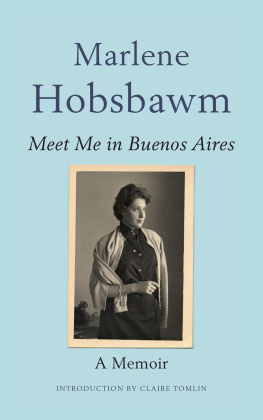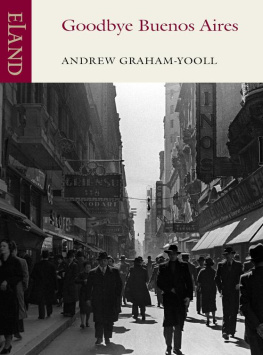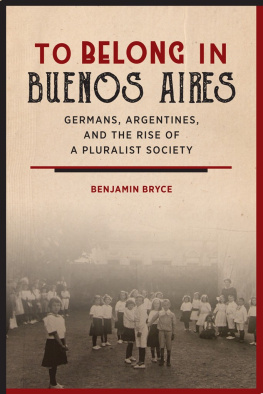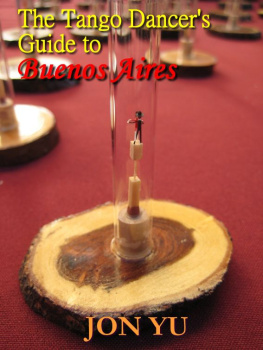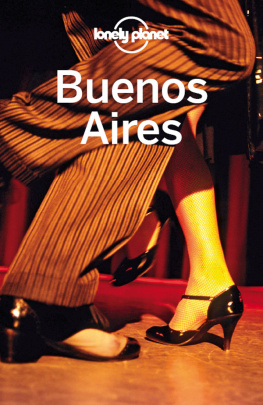Marlene Hobsbawm - Meet Me in Buenos Aires; a memoir
Here you can read online Marlene Hobsbawm - Meet Me in Buenos Aires; a memoir full text of the book (entire story) in english for free. Download pdf and epub, get meaning, cover and reviews about this ebook. year: 2019, publisher: Muswell Press, genre: Non-fiction. Description of the work, (preface) as well as reviews are available. Best literature library LitArk.com created for fans of good reading and offers a wide selection of genres:
Romance novel
Science fiction
Adventure
Detective
Science
History
Home and family
Prose
Art
Politics
Computer
Non-fiction
Religion
Business
Children
Humor
Choose a favorite category and find really read worthwhile books. Enjoy immersion in the world of imagination, feel the emotions of the characters or learn something new for yourself, make an fascinating discovery.
- Book:Meet Me in Buenos Aires; a memoir
- Author:
- Publisher:Muswell Press
- Genre:
- Year:2019
- Rating:5 / 5
- Favourites:Add to favourites
- Your mark:
- 100
- 1
- 2
- 3
- 4
- 5
Meet Me in Buenos Aires; a memoir: summary, description and annotation
We offer to read an annotation, description, summary or preface (depends on what the author of the book "Meet Me in Buenos Aires; a memoir" wrote himself). If you haven't found the necessary information about the book — write in the comments, we will try to find it.
Meet Me in Buenos Aires; a memoir — read online for free the complete book (whole text) full work
Below is the text of the book, divided by pages. System saving the place of the last page read, allows you to conveniently read the book "Meet Me in Buenos Aires; a memoir" online for free, without having to search again every time where you left off. Put a bookmark, and you can go to the page where you finished reading at any time.
Font size:
Interval:
Bookmark:
For the joyful grandchildren:
Roman, Anoushka, Wolfgang, Milo, Eve, Rachael and Maxim.
B ecoming a singleton after fifty years of marriage was an adventure of its own. And starting the endeavour of writing a memoir at eighty-five was quite optimistic, as my vocabulary and memory are diminishing.
I didnt set out to write a memoir: it was a project that unfolded slowly. Once the Cambridge historian Sir Richard Evans expressed his interest in writing my husband Erics biography, I naturally became very involved. This seven-year undertaking stirred up memories of my own life from times before, with and after Eric. Once I began, I found myself compelled to continue, but above all, I wanted my grandchildren to know about my life.
Not being a historian, I was more interested in remembering life from another angle piecing together a record of family, friendship, travel and an unwavering love between two unlikely individuals.
T he Hobsbawms Eric and Marlene always seemed to me an example of a perfect couple, mutually devoted and at the same time welcoming friends to their house with extraordinary generosity. Invitations to dinners came regularly, to Sunday lunches, to visit them in their cottage in Wales, to celebrate at memorable parties. With Marlene and Eric you always enjoyed yourselves good talk, good jokes, good arguments, good friends, good food, good wine. And Marlene was cook and organiser, while also teaching music, raising the children and dealing with every sort of practical problem thrown up by family life and marriage to a hard-working and celebrated husband.
I knew Eric by reputation when I was an undergraduate at Cambridge, and my friend Neal Ascherson was taught by him and spoke of him with admiration. While researching my first book in the early 1970s, I therefore consulted Eric on some historical points. My subject was Mary Wollstonecraft, who proclaimed the rights of women in the 1790s, and my impression was that he was not exactly a feminist, while being more kind and helpful in his response than I could have hoped, as indeed he was whenever I asked for advice or help. He also wrote the occasional review for me when I worked on the New Statesman in the mid-seventies, and this was when I went to their house in Hampstead for the first time and met Marlene. I thought she was amazing and we formed a friendship that has strengthened ever since: forty-five years, I make it.
I realise now how little I knew of her early life, although we were almost the same age and both had continental origins I French, she Viennese. I understood she had been brought to England as a small child when her father, a successful businessman, saw how dangerous Hitler was. I once asked her about learning a second language and she gave me a charming account of how she had refused to speak a word of English for a long time I suppose it was a form of protest at being uprooted but that one day her mother, listening outside the room where she was playing alone, heard her addressing her dolls in perfectly good English. The stubborn, clever child predicted the versatile and charming woman.
Reading her memoir I realise that she and I shared the experience of being sent off to boarding schools we did not always like she ran away, I fell ill and that as young women we were both exploring Paris at about the same time, studying French history, reading Gide and Colette, entranced by Les Enfants du Paradis, Prvert, Charles Trenet, and the streets, bridges, parks and paintings in the galleries.
We both also went through the then almost obligatory ritual for young women of learning secretarial skills. After that she, with immense dash, took herself to Italy and found jobs in Rome and Capri, lived a life of utmost sophistication, and moved on to work in the Congo for a year. Adventurous, brave and loyal, she made friends wherever she went, and kept them.
She was twenty-nine when she met and married Eric. He was already known as a scholar, teacher and historian whose books became instant classics, and was greatly in demand as a speaker all over the world. Marlene often travelled with him while also bringing up their son and daughter and establishing a home life that gave him time and space to work. In my head Im a continental woman, she writes: I think this means she knows how to combine domestic and intellectual life and make it look easy.
But it is not easy. Marlene gave Eric the support he needed to achieve greatness while always remaining a strong and decisive person in her own right. In effect, she taught him by her strength to respect feminism. Her memoir, starting from the sadness of exile and war in childhood, reveals her on every page as enterprising, courageous and warm-hearted and is a delight to read.
Claire Tomalin
July 2019
I was born in Vienna in 1932, the third and youngest child of Louise (Lilly) and Theodore (Theo) Schwarz. My older brothers were Victor Hugo (Vicky), who was five years old and Walter, two years old. On the whole, Mother brought us up mostly as die Kinder the children and I liked being lumped together like this even when not keeping up. I felt safe and happy. We had a nanny and a maid, and lived in the leafy suburb of Dbling.
My father, a middle child of ten children, came from Innsbruck. He was lively and not the type to stay put in the Tyrol. As a young man he enterprisingly got himself a job in the luxury hotel business in Paris, where he completely fell for the city, the French, and the cosmopolitan life around him. Later on, he became a businessman in the textile industry. He must have had a flair for it, as we lived well. I believe he had a good reputation and he enjoyed his work, especially travelling and making contacts all over Europe. He spoke several languages and was very interested in politics. Mother had to save all the English newspapers for him when he went away on his business trips. His mother, Grandma Rosa, was our only living grandparent. She regularly came to visit us in Vienna and we had holidays in her house in Igls, up in the hills above Innsbruck. She had a reputation for being difficult, but my mother liked and respected her.
My mother Lilly was born in Vienna, the youngest of five, and was such a late arrival that her siblings were already aged eighteen, seventeen, sixteen, and eleven. Her nearest sister Emmy was responsible for most of her upbringing. Mother remembered a school friend saying, You dont have to do what she says she is only your sister. Lilly did not have a career and was twenty-one when she married my father. Their roles were pretty clear: Father was the teacher and Mother the pupil. Jumping ahead twenty-five years, my own marriage followed a not entirely dissimilar pattern.
My nursery school was located in the basement of our building, which must have felt cosy, and it was run by my mothers niece. I remember going down long steps willingly and coming back up again. I was about three years old.
During this time, which seems like idyllic family life, my parents had many anxieties, as they were planning to leave Austria for good. My father believed the things that Adolf Hitler was saying in his speeches and he realised the dangers so close in Germany, unlike many of our Viennese friends and family, who never believed Hitler would carry out his plans. My brothers were being prepared for this dramatic change, especially my elder brother Vicky. But nothing was said to me. I was considered too young and was to be protected. My mother and brothers were already having English lessons. My brother , which depicts this early part of our lives extremely well and in more detail.
Walter Schwarz, The Ideal Occupation (Brighton: Revel Barker Publishing, 2011), pp. 630.
Font size:
Interval:
Bookmark:
Similar books «Meet Me in Buenos Aires; a memoir»
Look at similar books to Meet Me in Buenos Aires; a memoir. We have selected literature similar in name and meaning in the hope of providing readers with more options to find new, interesting, not yet read works.
Discussion, reviews of the book Meet Me in Buenos Aires; a memoir and just readers' own opinions. Leave your comments, write what you think about the work, its meaning or the main characters. Specify what exactly you liked and what you didn't like, and why you think so.

